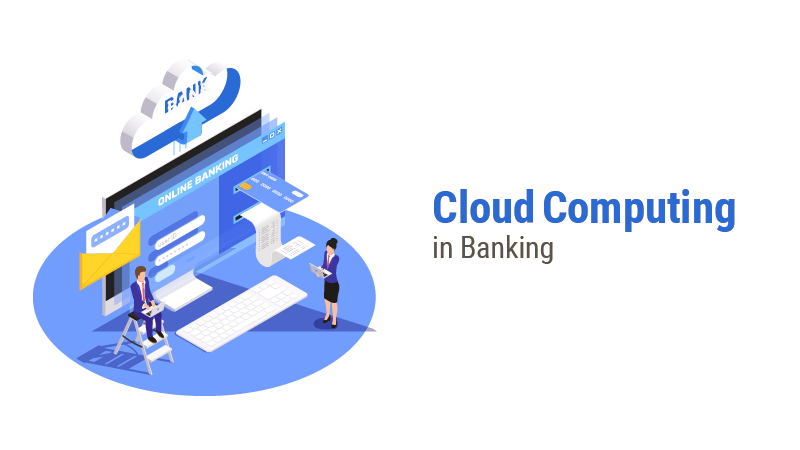Cloud Computing in Banking

Since the beginning of cloud computing, there have been a number of organizations that are gradually migrating from the banking world to it. The amount of data generated and used in the economic sector is increasing at a rapid pace. Cloud computing in the banking sector offers compatibility, safe storage capacity, 24 × 7 operating hours, etc. The inception of cloud-based software has provided many advantages to organizations from different sectors. Of all the major sectors, the banking industry has taken most of the benefits due to cloud technology.
Let us know more about the influence of cloud computing in the banking sector.
Benefits of cloud computing
We have mentioned that cloud computing offers a lot of benefits to the banking sector. Here are some of them:
Improved data security
The economic impact of a breach in data security is indisputably one of the most critical consequences which may lead to the loss of millions of dollars. Even during this increasing amount of data breaches, most financial institutions still depend on on-site systems. The advent of cloud computing has brought a better option to prevent data fraud by providing an up-to-date customer-oriented platform with outstanding security features to protect banking data.
Better cost optimization
One of the major challenges faced by many organizations while using a legacy on-premise system is difficulty in adapting to routine organizational changes. With cloud computing, financial institutions will be able to meet their ever-changing needs: convert a huge leading capital expenditure into small and current operating costs, avoid cost on infrastructure, server space, and resources for IT staffs. Moreover, this distinctive nature of cloud computing enables banking institutions to pick the services they need on a pay-as-you-use model.
Increased efficiency
The cloud infrastructure in banking enables financial firms to accelerate operations with better efficiency. The buyers and sellers can be connected on a common platform in order to simplify the payment processes. It helps to speed up transactions and track data easily.
Business continuity
Cloud computing offers financial institutions including banks and other firms with high data protection, error tolerance, and revival of organizations from disaster. It offers redundancy at a higher level and backup at a relatively low cost compared to traditional handling solutions.
Business agility and focus
As cloud infrastructure offers flexibility, the development cycle of new products in financial institutions will take only a short time period. It gives faster and more efficient assistance to banking customers who are in need of the bank’s service. There is no need for investment in infrastructure as the cloud is available on a pay-as-you-go basis, which saves time for initial setup as well. Cloud computing does not support capital investment while proceeding with a new product.
Green IT
Organizations can shift their services to a virtual environment by using cloud computing. This not only minimizes the consumption of a large amount of energy but also reduces the carbon footprint obtained while building a physical infrastructure, which leads to more efficient use of computing power and low idle time.
Cloud computing – Challenges
Though cloud computing offers these many benefits in the banking sector, why are most financial institutions still doubtful of employing it? It is because of the challenges they may face while implementing it in their organizations. Here are some of them:
Data security and privacy
Security remains a primary concern in any organization and it has utmost importance when it comes to financial institutions. Bank data contains strategic information or sensitive data and protecting it from security breaches is paramount for the banking sector. Every technology has security issues and as a technology cloud computing is no different from that. In the cloud, security breaches can be prevented to a larger extent but cannot be avoided completely.
Regulatory and compliance
A bank must adhere to strict standards which cannot be compromised under any circumstances. Most of the banking regulators may need the financial data of a customer living in the same nation. For some compliance regulations, valuable data on common servers or databases may not be combined with other data. Therefore, banks need to have an exact idea about the given environment where their information lies.
No complete control
Financial organizations have major concerns while controlling crucial business applications and a large amount of customer data. Transferring it to a third-party cloud service provider may compromise the flexibility and agility it offers. Therefore, not having control over large amounts of data discourages companies from transferring to the cloud.
Factors to be considered while implementing cloud in banking
Define ROI
Banks should be careful not to invest heavily in cloud computing until clear benefits are available. The first step is getting a detailed explanation from cloud service providers about the costs and repercussions of transferring current banking applications and infrastructure to the cloud. Bank has the full rights to validate the Return on Investment (ROI) it may get from implementing cloud technology.
Choose expertise service providers
Banks must use a roadmap to handle cloud service delivery programs. Financial organizations can look for service providers who have proven experience in pilot projects and have expertise in cloud computing ventures. Banks can begin with small and simple applications like CRM (Customer Relationship Management) and can jump on to major business applications later.
Understand data confidentiality and regulatory requirements
To make the best use of cloud computing and to make informed decisions, banks need to have a better understanding of privacy and regulatory issues. In order to meet local regulations and client privacy requirements, banks are required to store sensitive data within firewalls. For this reason, private cloud service models are a better option when compared to the public or a hybrid cloud operating model. Due to the increasing trust of the consumers in the public cloud model, there are chances for banks to shift to the public model in the near future.
Wrap Up
Banks were slow to adopt cloud computing due to many challenges which may result in reliability issues and security risks. At the same time, banks also wanted to secure their financial information through restricted access. This can be done by cloud computing only. Nowadays banks offer a number of services, as they have different needs based on the migration of applications to the cloud. Cloud computing enables banks to generate more dynamic and flexible business promises for emerging and competitive markets and supports them to change their business processes.
Get Started with our Cloud Computing ServicesBlogs by Category
AppForms Artificial Intelligence Blockchain Call Centers Chatbots Cloud Computing Data Management Design Digital Marketing Digital Transformation Enterprise Applications FinTech Insights LowCode Development Microsoft Mobile Apps News Office 365 Robotic Process Automation Security SharePoint Software Development Web ApplicationZero-Knowledge Cloud Storage: Everything You Need to Know.

2024-05-27 14:08:18